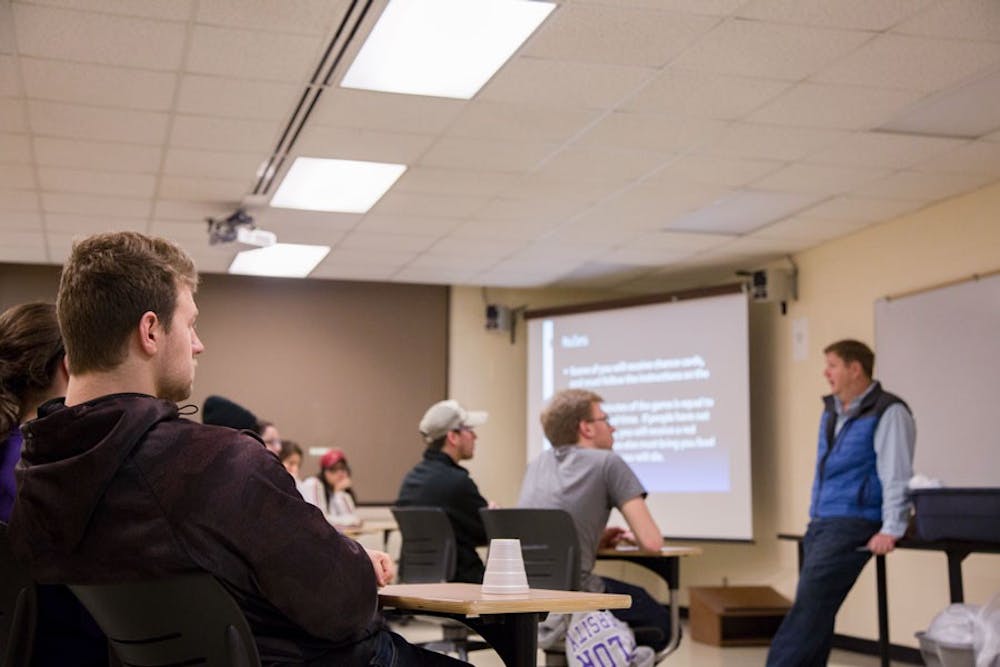By Brianna Kudisch | Echo
The room is dark.
You start moving up the stairs, but you stumble because you can't see. You cautiously make your way up, avoiding setting off a landmine that threatens to end your trip before it begins. When you finally reach the top, you stumble towards the guards. There's shouting in another language and confusion arises. Which line do you get in? Where do you go?
This was the experience of students who participated in Global Outreach and the Sociology Department's Refugee Simulation Monday and Tuesday night as part of Social Justice Week. The darkness, generated by blindfolds and turned-off lights, and landmines, in the form of bubble wrap, were created by Director & Associate Professor of Public Health Bob Aronson and Professor of Sociology Michael Jessup.
Started about five years ago, the refugee simulation is meant to give students a small glimpse into the journey and life of a refugee. Feelings of vulnerability, fear, confusion and anxiety are generated as students put themselves through the process of fleeing their "home country" of Afghanistan and taking refuge in Pakistan.
Prior to the simulation, Jessup talked to the groups, explaining the persecution the Afghan people are facing and why they're fleeing. He also described what the journey to Pakistan would be like for the refugees.
When they arrive, each student is assigned a personality complete with a name, age, marital status, profession and list of family members. In hopes of creating an authentic experience, women could only talk to those in their "family"-recognizable by an identifying symbol on their card. All the women had to wear scarves covering their heads and guards and officials intentionally treated men better than women.
After the landmines simulation, students wandered to different stations: an aid organization, food station, health clinic, jail or an Urdu language test. If a participant's card identified a health issue, then they had to go to the health clinic first.
Students could possibly be denied at any of the stations, sending them back to the end of the line or into a waiting period. Every 15 minutes counted as a day, forcing students to worry about eating food, staying with their family and filling out applications each day.
Junior Graham Brown, whose identity was a 27-year-old healthy, unmarried male doctor felt uncomfortable, despite his advantages as a young male. "I had the easiest run-in, and it was still frustrating for me," Brown said. "I can't imagine people who had characters as 40-year-old women (who) were crippled."
After the event, a debriefing prompted students to reflect on their experience and pray for refugees, both those abroad and those on campus. The key purpose of the simulation was to increase understanding and awareness of what refugees go through, and possibly deepen empathy for those individuals.
Sophomore Katie Tupper's character, a 22-year-old married woman with one son, had a head wound and was malnourished. When she arrived, she entered the health clinic for treatment but was then taken to prison by guards, while waiting for another treatment, for unknown reasons.
Tupper is currently working on a research project for her Orphans and Vulnerable Children class, exploring the health problems refugees face and how they are being addressed.
"(The simulation made) me really want to do something more," she said. "It's a little bit of feeling helpless combined with a little bit of hopefulness because I know there are a lot of problems, but there are people learning more about the situation and trying to help refugees wherever they can."
The current refugee crisis has largely involved Syria, with almost five million registered people having fled Syria since 2011, when violent civil war broke out, according to the UN Refugee Agency. As a result, refugees are seeking asylum in neighboring Jordan, Lebanon, Turkey and additional European countries.
But other countries have millions of internally displaced people as well: Among the 65.3 million people forced to leave their homes, over 21 million people are refugees, creating the largest displacement on record, according to the UN Refugee Agency.
Resettling refugees has been a source of political turmoil for both the European Union and the United States. With the newly signed version of the immigration executive order from President Trump, which will go into effect on March 16, there is no longer an indefinite ban on Syrian refugees entering the U.S., but instead a 120-day suspension of the entire refugee program.
Despite the government's position on refugees, Christians have a clear calling to care for refugees, according to Aronson and Jessup: "This is not a multiple choice: Care for refugees (or) not care for refugees," Jessup said. "No, it's pretty clear."
"From the book of Isaiah, especially chapter 1 and chapter 58, to me, it really seems like God despises . . . personal piety that's indifferent to oppression," Aronson continued. "If all we're about is personal piety, it really leaves a bad taste in God's mouth."



